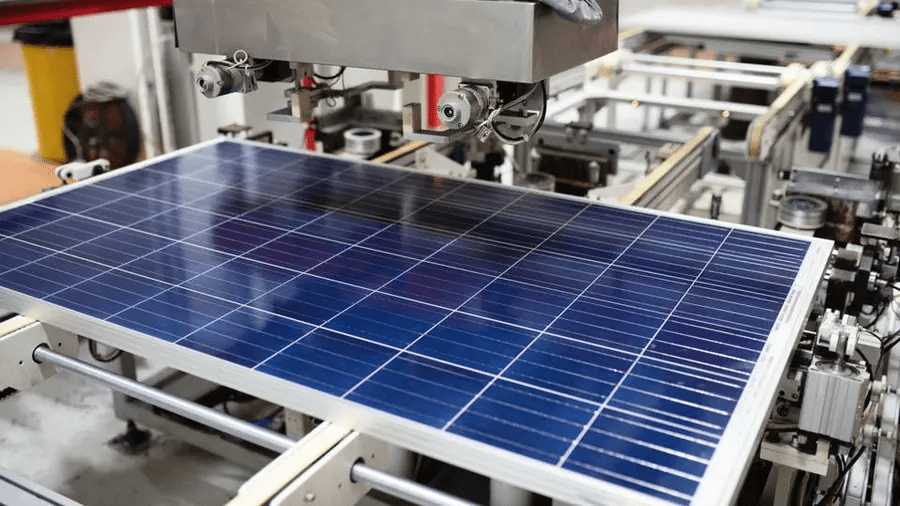In today’s world, where people are increasingly worried about the environment and moving towards cleaner energy, India has become a big part of the global solar energy industry. The country’s vast potential for harnessing solar energy, along with a concerted effort to reduce carbon emissions, has spurred the growth of its solar manufacturing sector. India’s solar manufacturers are not only contributing significantly to the nation’s renewable energy capacity but also playing a crucial role in driving innovation and sustainability on a global scale.
Solar Energy in India: A Growing Imperative
India, with its abundant sunlight, presents an ideal environment for the proliferation of solar energy. The Indian government’s ambitious targets to expand solar energy capacity have garnered international attention. The National Solar Mission, launched in 2010, aimed to achieve 20 GW of solar capacity by 2022, and its success led to more ambitious goals. India is now aiming to achieve 40 GW of renewable energy capacity by 2023-2024, with a substantial portion coming from solar energy sources.
As the demand for solar energy increases, so does the importance of a strong and innovative solar manufacturing sector. India has made significant strides in this area, becoming one of the world’s leading producers of solar panels and components.
The Role of Solar Manufacturers in India
1. Driving Solar Innovation
India’s solar manufacturers have played a pivotal role in driving innovation within the solar industry. By investing in research and development, these companies have been able to enhance the efficiency and effectiveness of solar panels and associated technologies.
For instance, many Indian solar manufacturers have focused on developing advanced solar cell technologies, including monocrystalline and polycrystalline cells, as well as thin-film solar cells. These innovations have significantly improved the efficiency of solar panels and reduced the cost of manufacturing, making solar energy more affordable and accessible to a broader audience.
In addition, innovations in the manufacturing process have also led to reduced waste and increased sustainability. Manufacturers have adopted eco-friendly practices, such as recycling and reusing materials, and implementing more efficient production techniques to minimize their environmental impact.
2. Affordable Solar Solutions
India’s solar manufacturers have been instrumental in driving down the cost of solar power. By focusing on economies of scale and technological advancements, they have made solar panels and components more affordable for consumers, businesses, and government projects. This affordability has been a key factor in the rapid expansion of solar energy capacity in the country.
Indian manufacturers have also been active in producing off-grid and decentralized solar solutions, which are particularly beneficial in rural and remote areas. These solutions provide access to clean energy, improving the quality of life and economic opportunities for those who were previously underserved.
3. Creating Local Employment Opportunities
The growth of the solar manufacturing sector in India has led to the creation of numerous job opportunities. As the industry expands, more skilled and unskilled labor is required, benefiting both urban and rural communities. This has a significant impact on reducing unemployment and improving the socio-economic conditions of many individuals and families.
Moreover, solar manufacturing units often source raw materials and components locally, further stimulating regional economies. By supporting local suppliers and businesses, the solar industry contributes to the overall development of the regions where manufacturing facilities are located.
- 4. Exporting Solar Expertise
India’s solar manufacturers are not only meeting domestic demand but also making a mark on the global stage. These companies are exporting solar panels and components to various countries, thereby promoting India’s expertise in the renewable energy sector. This not only benefits the manufacturers but also contributes to India’s economic growth and strengthens its diplomatic ties with other nations.
The Role of Government Policies
It’s important to acknowledge that India’s solar manufacturing success is not solely due to the efforts of private companies. Government policies and initiatives have played a pivotal role in shaping the industry’s growth. Key policies, like the Modified Special Incentive Package Scheme (M-SIPS) and the Electronics Manufacturing Clusters (EMC) scheme, have offered incentives to solar manufacturers to set up and expand their production facilities.
These policies have not only provided financial incentives but also eased regulatory and logistical challenges that manufacturers often face. They have encouraged both local and foreign investments in India’s solar manufacturing sector.
Challenges and the Way Forward
While India’s solar manufacturing sector has made substantial progress, it is not without its challenges. The industry faces competition from established global players, particularly in the production of high-efficiency solar cells and modules. Additionally, supply chain disruptions and fluctuating raw material prices can impact production and pricing.
To overcome these challenges and continue driving innovation and sustainability, the Indian government and manufacturers must work together to:
- Invest in Research and Development: Continued investment in R&D is essential to remain at the forefront of solar technology. Collaboration with research institutions and international partnerships can help Indian manufacturers stay competitive in the global market.
- Strengthen Supply Chains: Ensuring a stable supply chain is crucial for consistent manufacturing. Developing a reliable network of suppliers and exploring alternative materials can help mitigate supply chain disruptions.
- Promote Skilled Workforce: Developing a skilled workforce is essential to meet the growing demands of the solar industry. Investment in training and education programs can help create a pool of talent to support the sector.
- Maintain Supportive Policies: The Indian government must continue to provide incentives, subsidies, and supportive policies to encourage investment in solar manufacturing. These policies should focus on fostering both domestic and foreign investments.
Conclusion
India’s solar manufacturing sector has made remarkable strides in driving innovation, sustainability, and economic growth. As the world transitions towards renewable energy sources, the role of Indian solar manufacturers becomes increasingly significant. Their efforts not only contribute to India’s energy security but also position the country as a global leader in the solar industry.
The Indian government, in collaboration with private manufacturers, should continue to nurture this sector through supportive policies and investments in research and development. With a continued focus on innovation and sustainability, India’s solar manufacturers are poised to play a pivotal role in shaping the future of clean energy, both domestically and on the global stage.










